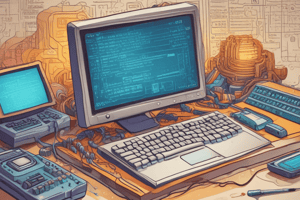Podcast
Questions and Answers
Computers can execute instructions written in various programming languages such as C++, Java, and ______.
Computers can execute instructions written in various programming languages such as C++, Java, and ______.
Python
An operating system (OS) acts as a mediator between a user and the computer's ______.
An operating system (OS) acts as a mediator between a user and the computer's ______.
hardware
Desktop computers are larger, more powerful computers designed for home or office ______.
Desktop computers are larger, more powerful computers designed for home or office ______.
use
Smartphones are small, handheld computers with touchscreens, mobile connectivity, and ______ stores.
Smartphones are small, handheld computers with touchscreens, mobile connectivity, and ______ stores.
Computers enable fast and efficient communication through email, instant messaging, and ______ calls.
Computers enable fast and efficient communication through email, instant messaging, and ______ calls.
What type of memory provides fast access to frequently used data and instructions in a computer?
What type of memory provides fast access to frequently used data and instructions in a computer?
Which type of programming language allows programmers to focus more on problem-solving rather than hardware intricacies?
Which type of programming language allows programmers to focus more on problem-solving rather than hardware intricacies?
Which sector extensively uses computers for accounting, finance, and customer relationship management applications?
Which sector extensively uses computers for accounting, finance, and customer relationship management applications?
Which device allows data exchange between a computer and the outside world?
Which device allows data exchange between a computer and the outside world?
What is the primary purpose of computers in healthcare applications?
What is the primary purpose of computers in healthcare applications?
Flashcards are hidden until you start studying
Study Notes
Exploring the Fascinating World of Computers
Computers have become an essential part of our daily lives, shaping the way we communicate, work, and think. This brief guide will help you understand the key aspects of these remarkable machines, taking a closer look at their history, inner workings, and applications.
History of Computers
Computing began as early as the 17th century with the invention of the mechanical calculator. However, the first modern computer, known as ENIAC (Electronic Numerical Integrator and Computer), was built in 1946. Since then, computers have undergone a remarkable evolution, from punch card machines and mainframes to personal computers and smartphones.
Basic Components and Architecture
A computer is made up of several components that work together to carry out tasks. The Central Processing Unit (CPU) is the brain of the computer, performing arithmetic and logical operations on data. The Memory stores computer programs and data, and the Input/Output (I/O) devices allow users to interact with the computer.
As for computer architecture, computers can be divided into two main categories: Centralized and Distributed. Centralized computers have a single processor and memory, while distributed computers have multiple processors and memories connected through a network.
Programming and Operating Systems
Programming is the process of writing instructions for a computer to follow. Computers can execute instructions written in various programming languages such as C++, Java, and Python.
An operating system (OS) acts as a mediator between a user and the computer's hardware. It manages the computer's resources, allows users to run programs, and provides a user interface. Common examples of operating systems include Windows, macOS, and Linux.
Types of Computers
Computers are classified into several types based on their processing power, form factor, and purpose.
- Desktop: Larger, more powerful computers designed for home or office use.
- Laptop: Portable computers with built-in displays, keyboards, and batteries.
- Smartphone: Small, handheld computers with touchscreens, mobile connectivity, and app stores.
- Tablet: Touchscreen devices designed for reading, browsing, and other lightweight computing tasks.
- Server: High-performance computers used for storing and processing data, often connected to a network.
Applications of Computers
Computers have revolutionized countless industries and transformed our daily lives. Some notable applications of computers include:
- Data processing: Computers can process, store, and analyze vast amounts of data in a fraction of the time it would take humans.
- Communication and networking: Computers enable fast and efficient communication through email, instant messaging, and voice calls.
- Entertainment: Computers provide a platform for video games, music, movies, and other forms of entertainment.
- Business: Computers allow businesses to automate tasks, streamline operations, and improve customer service.
- Science and research: Computers are essential tools for scientists, helping them to conduct experiments, run simulations, and analyze data.
Conclusion
From their humble beginnings as calculators to the powerful machines we use today, computers have changed the world. As technology continues to evolve, computers will continue to play a crucial role in shaping the future of our society. Whether you're programming an app, using a computer for personal use, or exploring the countless applications of these remarkable machines, understanding the basics of computers is essential for staying ahead in our rapidly changing world.
Studying That Suits You
Use AI to generate personalized quizzes and flashcards to suit your learning preferences.



